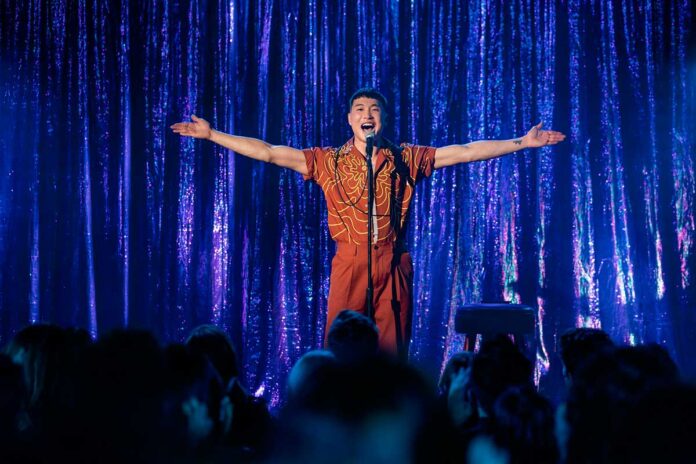Fresh off writing and starring in the hit, “Fire Island,” out gay Joel Kim Booster has a stand-up comedy special, “Psychosexual,” dropping June 21 on Netflix. The 65-minute set allows fans of the comedian to see him perform and he is very, very funny.
Booster enters the stage talking about representation, and throughout his act he references being gay and Asian. But he also talks about straight culture, and how different much of it is from his experiences. The layers he unpacks are interesting because he talks candidly about codeswitching and how he never wants to lie about being gay — unless he’s got particularly tough uber driver. And when he talks about being in a P.F. Chang’s in Boise, ID, where he is revered for being Asian, he commands that the cuisine should “unfuse,” as if food, too, is boxed in by its ethnicity.
Using humor to diffuse identity politics is why Booster is so clever. He creates a running gag throughout his 3-act set where he dialogues with Ben, a straight, white man in the audience who was unfamiliar with the comedian prior to seeing him perform here. Booster shrewdly asks Ben if his first act, which is all gay- and Asian-themed jokes, is funnier than his second act, where the jokes are more universal, and “relatable.” (The third act crosses the line into crude and sexual humor, which is still very funny, and mix of acts 1 and 2.)
“Psychosexual” is especially hilarious when Booster is trolling the straights. A bit where he talks to a married, monogamous straight couple yields some of the biggest chuckles, but not in ways that are offensive, which is admirable.
Booster wants to appeal to all demographics, and part of his point in his set is to play up stereotypes to debunk them. A discussion he has about how certain Asian cultures are racist towards other Asian cultures is tricky, but it provides a payoff. He also laughs off the “model minority myth,” indicating that he grew up in a white Southern Baptist family. When his adoptive mother complains about statues being torn down, Booster’s response is to shrug and complain about the importance of having a good internet connection.
And connection seems to be key to Booster’s identity and humor. He comments on being a “visible minority” and “pathologizing behavior.” He discusses the racism of “rice queens” (white men who have Asian fetishes) and talks about dating. His facial expressions are priceless — especially when he describes sex, or someone taking a photo of a particular part of their body. His observations about dick pics, or a date gone wrong are as horrifying as they are amusing.
“Pyschosexual” also allows the writer/performer to discuss drugs, some of which he procures on a gay cruise, which segues into an “airtight analogy” on the differences between cats and dogs. Booster is adamantly a cat lover and provides solid reasoning for why cats are better — even as he recounts a fraught visit to a cat café, which he cannily compares to an activity that involves women, and not animals.
When Booster talks about his personal life — claiming that he enjoys threesomes because he can “box out the weaker husband” — or goes into detail about masturbating, he generates mirth, not shame. (He even asks an audience member about his habits of self-abuse, to everyone’s surprise and delight.) This leads to a discussion of a more serious topic, but it displays Booster’s ability and agility to talk about sex in ways that make his audiences (including that straight white man, Ben, who admits he lives in WeHo) feel comfortable.
Booster is easy to identify with, and he is relatable because he does not want to be a role model. His own life is hardly perfect, and he is happy (perhaps eager) to share his flaws and foibles with audiences.
“Psychosexual” never comes across as a therapy session where Booster tries to process his feelings about being gay or Korean, or not wanting to have kids. He is equally adept at talking about the issues he has with public bathrooms — which is about having to wait for a stall because someone is taking their time on social media — and true crime series and podcasts, which are becoming tiresome. He has his finger on the pulse of culture and delivers perceptive observations about life, sex, and being gay and Asian.
With both “Fire Island” and now “Psychosexual,” Booster is getting his voice heard. Listen up! What he has to say is both pointed and timely, and very, very funny.
